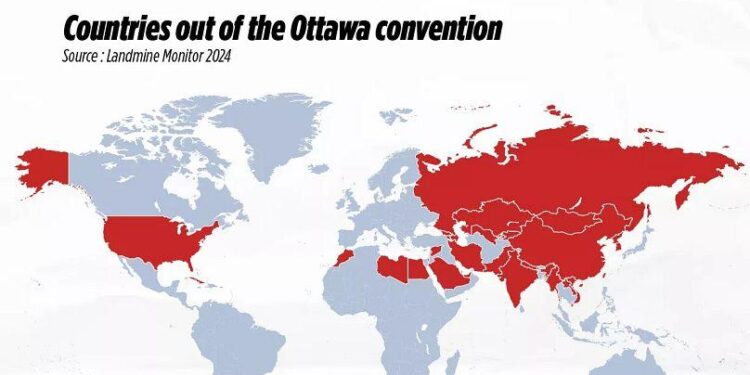In a significant shift in defense policy, Finland’s lawmakers have voted to withdraw from the international treaty banning land mines, marking a notable move amidst escalating regional tensions. The Nordic country, which shares a lengthy border with Russia, is intensifying its military capabilities in response to growing security concerns. This decision reflects Finland’s strategic recalibration as it seeks to bolster its defenses against potential threats from its eastern neighbor.
Finland’s Decision to Exit Land Mine Treaty Signals Shift in Defense Strategy
Finland’s bold departure from the international land mine treaty represents a significant recalibration of its national defense policy, triggered largely by growing security concerns on its eastern border. Lawmakers voted decisively to prioritize territorial defense, signaling a readiness to adopt more robust deterrence measures amid increasing regional tensions. This move aligns with a broader strategy to fortify Finland’s deterrent capabilities without breaching future operational flexibility in response to evolving threats.
Key implications of Finland’s decision include:
- Enhanced capacity for defensive mine deployment tailored to Finland’s unique geography.
- A shift towards a more assertive deterrence posture emphasizing rapid response.
- Potential influence on Nordic defense collaboration, encouraging neighboring countries to revisit their own strategies.
- Raised concerns among humanitarian groups regarding the humanitarian impact and future clearance efforts.
| Aspect | Before Treaty Exit | After Treaty Exit |
|---|---|---|
| Mine Usage | Prohibited | Permitted for defense |
| International Standing | Committed to treaty | Reassessing alliances |
| Regional Defense Outlook | Conventional measures focus | Expanded deterrence toolkit |
| Humanitarian Concerns | Aligned with mine clearance efforts | Heightened risk and clearance challenges |
Implications for Regional Security Amid Rising Tensions with Russia
The decision by Finland to withdraw from the international land mine treaty signals a significant shift in regional security dynamics as tensions with Russia intensify. This move, aimed at enhancing Finland’s defensive capabilities along its extensive eastern border, highlights growing concerns over potential incursions and the need to prepare for asymmetric warfare. By lifting restrictions on land mine deployment, Finnish authorities are prioritizing deterrence, sending a clear message that they are ready to fortify their territory against any aggression.
Key security implications include:
- Heightened border defenses leading to a more robust, layered security posture
- Potential escalation of military activities in the Nordic-Baltic region
- Pressure on neighboring countries to reassess their own defense strategies
- Challenges to existing arms control frameworks, risking greater regional instability
| Country | Current Defense Strategy | Potential Reaction | ||||||||||||||||||
|---|---|---|---|---|---|---|---|---|---|---|---|---|---|---|---|---|---|---|---|---|
| Finland | Increased landmine deployment & border fortification | Strengthening military alliances, rapid mobilization | ||||||||||||||||||
| Sweden | Expanded air and naval patrols | Accelerated defense budget increases | ||||||||||||||||||
| Russia | Military presence near borders & hybrid tactics |
| Country | Current Defense Strategy | Potential Reaction | |||||||
|---|---|---|---|---|---|---|---|---|---|
| Finland | Increased landmine deployment & border fortification | Strengthening military alliances, rapid mobilization | |||||||
| Sweden | Expanded air and naval patrols | Accelerated defense budget increases | |||||||
| Russia | Military presence near borders & hybrid tactics |
| Recommended Diplomatic Actions | Expected Impact |
|---|---|
| Multilateral Security Forums | Increased regional transparency |
| Confidence-building Exercises | Reduced risk of accidental conflict |
| Communication Hotlines | Faster crisis response |
To Conclude
Finland’s decision to exit the land mine treaty marks a significant shift in its defense policy amid heightened security concerns in the Nordic region. As tensions with Russia continue to shape the geopolitical landscape, Helsinki’s move underscores the challenges faced by countries balancing international commitments with national security imperatives. The coming months will reveal how this development influences both regional stability and Finland’s military posture moving forward.
















